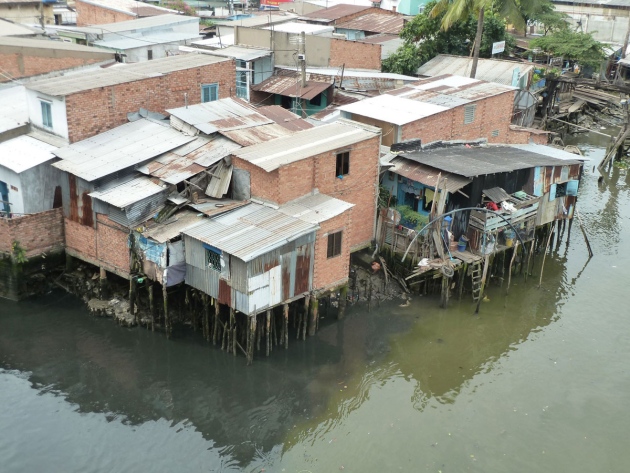
Canals in Ho Chi Minh City, Vietnam, could be linked to transmission of Shigella sonnei.
Shigella sonnei, a bacterium that causes dysentery, has spread across Vietnam despite major advances in sanitation and economic development in the country. Now scientists think that they know why.
In just 15 years, S. sonnei has mutated to resist many antibiotics and to produce a toxin that wipes out many of its microbial competitors, giving it an evolutionary edge, according to research published today in Proceedings of the National Academy of Sciences. The work tracks the bacterium's microevolution by sequencing 263 samples collected from hospitalized patients in Vietnam between 1995 and 2010 (ref. 1).
The genetic data also provide an insight into the development of antibiotic resistance in the country, where such drugs are readily available without a prescription. A single common ancestor gave rise to antibiotic-resistant S. sonnei, which completely replaced a related species, Shigella flexneri, as the major cause of dysentery in Vietnam. In addition to genes for antimicrobial resistance, S. sonnei acquired the gene for a toxin that kills other bacteria.
Genetic bottlenecks
Eileen Barry, a microbiologist at the University of Maryland School of Medicine in Baltimore, calls the analysis remarkable. “It is unique to have samples over a 15-year period to look at using these very advanced sequencing techniques.”
S. sonnei causes one-sixth of the more than 160 million cases of dysentery recorded worldwide every year. Although it is less deadly than other bacteria that produce the bloody diarrhoea, it is becoming increasingly common, especially in southeast Asia.
Based on their sequencing results, Stephen Baker of the Oxford University Clinical Research Unit in Ho Chi Minh City, Vietnam, and his colleagues created a model that pinpointed 1982 as the year that S. sonnei emerged in Vietnam. The bacterium probably originated in a densely populated area of Ho Chi Minh City and spread by the canal system, and it subsequently went through four 'genetic bottlenecks', in which mutations that arose in a small subset of the species rapidly became common. Because each of the bottlenecks coincided with increased infection rates, Baker's team argues that these events helped to confer antimicrobial resistance or some other competitive advantage on S. sonnei.
The first bottleneck, in 1994, coincided with spread of the gene for a colicin, a type of toxin that kills other Shigella species and Escherichia coli. Researchers believe that the colicin made by S. sonnei helps it to outcompete other gut bacteria as it infects a person's digestive tract.
The most recent bottleneck, in 2006, happened at around the same time that S. sonnei developed the ability to produce extended-spectrum β-lactamase, which is an enzyme that confers resistance to penicillin and other common oral antibiotics.
In addition to acquiring these broad genetic changes, S. sonnei from different areas of Vietnam began evolving locally to be resistant to other antibiotics. Distinct strains show similar patterns of resistance despite having different sets of genes. “You have different genes that do that same thing,” Baker adds, which demonstrates just how easily resistance can emerge.
In the meantime, other researchers are working to circumvent the spread of S. sonnei without using antibiotics. A Shigella vaccine entered phase I clinical trials earlier this year.
- Journal name:
- Nature
- DOI:
- doi:10.1038/nature.2013.13844


Commenting is currently unavailable.